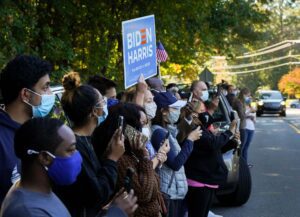After months of concerns about Postal Service delays, unfounded allegations about ballot fraud and worries that mail-in ballot deficiencies would disenfranchise voters, the 2020 election has mostly put the mail-in voting frenzy to rest – at least in North Carolina.
Even so, mail-in voting had its challenges. Processing 1,001,300 mail-in ballots required unprecedented resources.
“It was no small feat, but I am pleased to report that the election administration process in North Carolina went very well,” Damon Circosta, chair of the North Carolina State Board of Elections, said in an email to The 9th Street Journal.
The “no small feat” that Circosta referred to involves the 1,001,300 absentee-by-mail ballots cast in the battleground state as of Thursday, Nov. 12. Election officials counted mail-in ballots that were postmarked by Election Day and received by Thursday.

Tens of thousands of ballots were still counted as outstanding ballots this week, meaning ballots that were requested but not yet returned. It is unlikely that the state board will receive all of them because some people ultimately chose to vote at the polls or not to cast a ballot.
Another uncertainty: lots of lawsuits. They challenged various aspects of the state rules and demanded changes in the mail-in voting process. In one, for example, the North Carolina Alliance for Retired Americans asked that the North Carolina Supreme Court suspend the witness requirement for single-adult households, among other changes.
While the state board initially agreed to let voters fix missing witness signatures with an affidavit, Republican leaders resisted. That triggered a back and forth, which finally ended with an Oct. 18 decision that voters who submitted a ballot with missing witness information must cast a new vote.
Meanwhile, the U.S. Supreme Court ruled on Oct. 28 to uphold the mail-in ballot deadline extension to Nov. 12.
“We were in the midst of both people from the left and the right taking our processes through litigation…I can’t say that that back and forth didn’t come without its trials and tribulations,” Circosta said. “But even through all of that, even with uncertainty provided by courts from NC all the way to the Supreme Court, we were still able to conduct our process.”
Phil Lehman, chair of the Durham Board of Elections, said this year’s surge of mail-in ballots due to COVID-19 led to an unprecedented workload for election officials.
“We’re not a vote-by-mail state, so we’re not really set up to process huge numbers of mail ballots,” Lehman said. “They’re very labor intensive. They take a long time to review.”
Gerry Cohen, a member of the Wake County Board of Elections, said that he didn’t see any major problems in the voting process either. Still, he acknowledged that mail-in voting required more resources than in-person voting.
“It’s more expensive to process absentee ballots, but we completely understood why people wanted to vote by mail versus potentially risking themselves in person,” Cohen said.
Despite working around the clock with his colleagues, Circosta wrote that he was pleased with how the election had gone in the state.
“The election process was secure, accessible and safe,” Circosta wrote.




